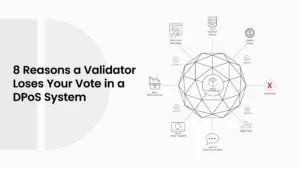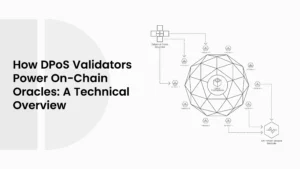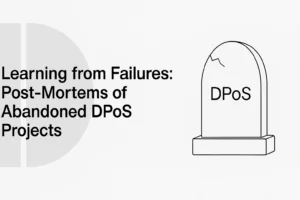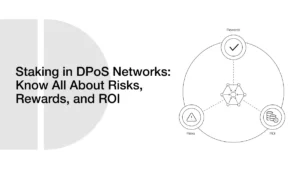DPoS Governance Insurance: Can Delegators Hedge Against Delegate Failure?
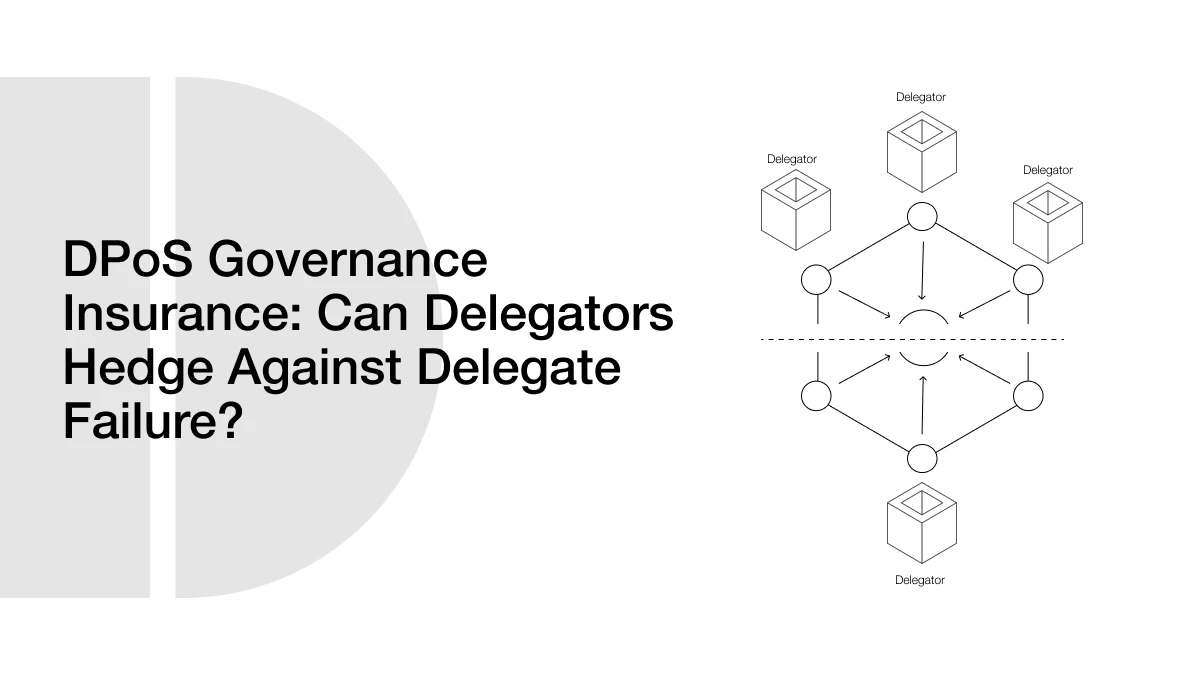
Blockchain is built on trust, but trust does not come easily. Every blockchain needs a system to decide which transactions are real and which are fake. This system is called a consensus mechanism. One of the most popular consensus methods today is Delegated Proof of Stake (DPoS).
- What is DPoS Governance?
- Delegated Proof of Stake in Simple Words
- Role of Delegators and Delegates
- Why Delegates Can Fail
- DPoS Compared to Other Consensus Models
- Why Delegate Failure is a Real Risk
- Technical Failures
- Misbehavior and Cheating
- Collusion and Cartels
- Apathy and Low Engagement
- Types of Delegate Failures and Their Impacts
- Why This Matters for Delegators
- What is Governance Insurance in DPoS?
- Simple Definition
- Why It Matters
- Types of Governance Insurance
- How It Could Work
- How Delegators Can Hedge Against Delegate Failure
- Re-Delegation
- Diversification
- Self-Monitoring
- Governance Insurance
- Delegator Risk Management Options
- Why These Options Matter
- Case Studies: Where DPoS Risks Have Appeared
- EOS: Cartel Formation and Centralization
- Steem: Governance Takeover Incident
- Lessons from These Examples
- Can Blockchain Really Offer Governance Insurance?
- Smart Contract Insurance Pools
- DAO-Based Insurance Funds
- Third-Party DeFi Coverage
- Possible Models of Governance Insurance
- Why This Matters
- Benefits of Governance Insurance for Delegators
- Confidence in Staking Decisions
- Protection Against Loss of Income
- More Participation from Smaller Holders
- Stronger Long-Term Trust in DPoS
- Challenges and Limitations of Governance Insurance
- Cost of Premiums
- Who Decides Payouts?
- Smart Contract Risks
- Moral Hazard
- Future of Governance and Insurance in DPoS
- AI Monitoring of Delegates
- Growth of Decentralized Insurance Markets
- Standard Feature in DPoS Chains
- Role of Regulation and Compliance
- Conclusion
- Frequently Asked Questions About DPoS Governance Insurance
- What is DPoS governance insurance?
- Why do delegators need insurance?
- How can governance insurance be built?
- Does governance insurance already exist?
- What are the risks of governance insurance?
- Glossary of Key Terms
In DPoS, token holders can vote for special representatives, called delegates. These delegates are responsible for validating transactions and keeping the blockchain running. In return, they earn rewards, and some of those rewards are shared with the voters, also known as delegators.
The system sounds simple, but there is a problem. What happens if a delegate fails? A delegate might go offline, break the rules, or even form cartels with other delegates. When this happens, delegators lose trust and, in many cases, lose money. That is where the idea of governance insurance comes in. Governance insurance could act as a safety net for delegators. Just like car insurance covers accidents, governance insurance could cover the risks of delegate failure.
In this blog, we will explore how DPoS works, why delegate failure is a big issue, and whether governance insurance can help delegators protect themselves.
What is DPoS Governance?
To understand why governance insurance matters, we first need to understand how DPoS governance works.
Delegated Proof of Stake in Simple Words
Delegated Proof of Stake is like a voting-based version of blockchain security. In Proof of Work (PoW), miners solve puzzles to validate transactions. In Proof of Stake (PoS), validators are chosen based on the coins they hold. DPoS takes a different path. Instead of everyone competing or being randomly selected, token holders vote for a smaller group of delegates. These delegates then produce blocks and verify transactions.
Think of it like a school election. Students (delegators) vote for class representatives (delegates). The chosen representatives handle the primary responsibilities, but if they fail to perform their duties effectively, students can vote them out.
Role of Delegators and Delegates
- Delegators: People who hold tokens and vote for delegates. Their stake (token balance) gives weight to their vote.
- Delegates: The winners of the vote. They run the network by creating blocks and processing transactions. They earn rewards and often share a portion with delegators.
Why Delegates Can Fail
Delegates are not perfect. Some may fail due to technical issues, such as server downtime. Others may act dishonestly, trying to manipulate the system. Sometimes, delegates form groups or “cartels” to control the network. When this happens, the blockchain loses some of its fairness and decentralization.
DPoS Compared to Other Consensus Models
To understand where governance insurance fits in, let’s compare DPoS with other systems.
| Feature | Proof of Work (PoW) | Proof of Stake (PoS) | Delegated Proof of Stake (DPoS) |
| Speed | Slow | Medium | Fast |
| Energy use | Very high | Lower | Very low |
| Governance style | Mining power | Random stake select | Community voting |
| Risk for users | Mining centralization | Rich get richer | Delegate failure or collusion |
As this table shows, DPoS is faster and more energy-efficient. However, it carries new risks that PoW and PoS do not have, especially the risk of delegate failure. This is why governance insurance could be important for delegators who want to hedge against these risks.
Why Delegate Failure is a Real Risk
At first, DPoS looks like a powerful system. Delegators vote, delegates work, and rewards are shared. But just like in real elections, the people who are chosen are not always perfect. Delegates can and do fail. When they fail, the whole system feels the impact, and delegators often pay the price.
Technical Failures
Sometimes, failure happens because of technology. A delegate might have weak hardware, poor internet connection, or face unexpected downtime. If a delegate’s server goes offline, it cannot produce blocks. That means the network slows down, and delegators lose rewards for that time.
Misbehavior and Cheating
Delegates can also fail because of bad behavior. Some delegates may double-sign blocks, break protocol rules, or even accept bribes. When this happens, blockchains may punish them with penalties, also known as slashing. These penalties can spread losses to the delegators who supported them.
Collusion and Cartels
Another big risk is collusion. Delegates can team up to form cartels. A cartel is a group that controls most of the votes or blocks production. This makes the system less fair and less decentralized. Instead of being a democracy, the blockchain becomes controlled by a few powerful groups. For delegators, this can mean lower rewards and less influence in governance.
Apathy and Low Engagement
Sometimes, failure is not active cheating but simple apathy. Delegates who stop engaging, fail to update systems, or don’t listen to their voters also damage the network. Apathy weakens governance and leads to poor results for everyone.
Types of Delegate Failures and Their Impacts
| Failure Type | Example | Impact on Delegators |
| Technical failure | Server outage | Lost block rewards, delays |
| Misbehavior | Double signing, bribes | Network penalties, slashing |
| Collusion/cartel | Delegates teaming up | Centralization, unfair payouts |
| Apathy | Low engagement, poor updates | Weak governance, missed rewards |
Why This Matters for Delegators
For delegators, the choice of a delegate is never risk-free. Even if a delegate looks reliable today, things can change tomorrow. A strong delegate could suffer a sudden failure or turn dishonest. Without protection, delegators risk losing both rewards and confidence in the system.
This is why many experts now ask: Can we build insurance systems inside DPoS governance? If so, delegators could hedge against these risks and feel safer when staking their tokens.
ALSO READ: Vouching for the Planet: Can Delegated Proof of Stake (DPoS) Handle Climate Data at Scale?
What is Governance Insurance in DPoS?
When people hear the word “insurance,” they usually think about cars, homes, or health. In each case, insurance means paying a small amount of money to protect against a bigger loss later. The same idea can be applied to DPoS governance.
Governance insurance is a way for delegators to protect themselves against the risks of delegate failure. Instead of losing all rewards or facing penalties when a delegate fails, insurance would provide coverage. This means delegators would receive some form of compensation, just like car owners receive money after an accident.
Simple Definition
Governance insurance in DPoS is a protection system that shields delegators from the financial impact of delegate failures. It can be built into the blockchain itself or offered by third-party protocols.
Why It Matters
Without insurance, delegators carry all the risks. If a delegate fails, delegators lose income, influence, and confidence. Insurance spreads the risk, so delegators feel safer participating in the network. This could encourage more people to stake, which strengthens the entire blockchain.
Types of Governance Insurance
There are a few ways governance insurance could be designed:
- Reward Protection: Covers missed block rewards when a delegate fails.
- Slashing Coverage: Compensates delegators if their delegate is penalized for bad behavior.
- Exit Protection: Protects delegators when they need to re-delegate quickly after a failure.
How It Could Work
Governance insurance could be powered by smart contracts or DAO funds. For example, delegators could pay a small premium into a smart contract pool. If a delegate fails, the pool pays out compensation automatically. Another model could be DAO-based, where a community votes on payouts using treasury funds.
How Delegators Can Hedge Against Delegate Failure
Even without formal governance insurance, delegators today have some ways to protect themselves. These strategies are not perfect, but they help reduce the risks of choosing the wrong delegate. In the future, insurance could become another important tool in this list.
Re-Delegation
One of the most common ways to reduce risk is re-delegation. If a delegate fails or shows bad behavior, delegators can move their tokens to another delegate. This allows them to adjust and keep earning rewards quickly. The downside is that re-delegation often takes time, and some rewards may be lost during the process.
Diversification
Another strategy is diversification. Instead of placing all tokens with one delegate, delegators can spread their tokens across several delegates. This reduces the chance of losing everything if one delegate fails. The drawback is that rewards may be smaller because the stake is divided.
Self-Monitoring
Some delegators choose to monitor delegates closely. They track performance, uptime, and community activity. This helps them act fast if something goes wrong. However, constant monitoring can be time-consuming and not realistic for casual users.
Governance Insurance
This is the new and growing idea. With governance insurance, delegators pay a small fee for peace of mind. If their delegate fails, insurance provides coverage. This could make staking safer and easier for everyday users, especially those who don’t want to spend time monitoring or moving their tokens often.
Delegator Risk Management Options
| Strategy | How It Works | Pros | Cons |
| Re-delegation | Move the stake to another delegate | Flexible, quick recovery | Rewards lost during downtime |
| Diversification | Spread stake across many delegates | Reduces single-point failure | Lower rewards if too spread |
| Self-monitoring | Track delegate activity manually | Free | Time consuming |
| Governance insurance | Buy coverage via a fund or a smart contract | Peace of mind, predictable | Extra cost, not widely tested |
Why These Options Matter
Delegators want both rewards and safety. Without risk management, they may lose confidence in DPoS systems. By using these strategies and adding governance insurance in the future, delegators can hedge against delegate failure while still enjoying the speed and efficiency of DPoS.
ALSO READ: How DPoS Offers Secure and Scalable Governance in the Future of Smart Cities
Case Studies: Where DPoS Risks Have Appeared
To really understand why governance insurance could be important, it helps to look at real examples. Several well-known DPoS blockchains have faced problems because of delegate failure or governance issues. These cases show how fragile the system can become when delegates act poorly or when power is concentrated.
EOS: Cartel Formation and Centralization
EOS is one of the biggest DPoS networks. It raised billions of dollars during its launch and promised to be faster and more scalable than older blockchains. But over time, EOS faced heavy criticism for centralization. Reports showed that some delegates formed cartels. Instead of competing fairly, they voted for each other to stay in power.
For delegators, this meant that voting power was no longer balanced. Rewards went mainly to the cartel members, and smaller delegators had less influence. Trust in EOS governance dropped, and critics called it proof that DPoS could turn into “rule by the few.”
Steem: Governance Takeover Incident
Steem, a blockchain for social media, faced a governance crisis in 2020. A major company bought a large share of tokens and used them to change the delegate structure. This takeover removed many community delegates and replaced them with company-backed ones.
Delegators who trusted their chosen delegates suddenly saw the governance flip overnight. Rewards and influence shifted, and many felt betrayed. While not a “technical failure,” this event showed how quickly governance in DPoS can be disrupted.
Lessons from These Examples
- EOS shows the risk of cartels and collusion.
- Lisk highlights the danger of delegate apathy.
- Steem proves that governance takeovers can destroy community trust.
In all three cases, delegators carried the burden. If governance insurance had been in place, they could have at least been compensated for lost rewards or unfair shifts in delegate power.
Can Blockchain Really Offer Governance Insurance?
The idea of governance insurance in DPoS sounds exciting, but the real question is: can it actually work? Blockchain technology already allows smart contracts, decentralized funds, and community-driven systems. These tools could make governance insurance possible, but the models need to be carefully designed.
Smart Contract Insurance Pools
One way to build governance insurance is through smart contract pools. Delegators could pay a small premium into a pool of funds. If a delegate fails, the smart contract would automatically release compensation. This method is transparent and doesn’t need a middleman, but it requires strong coding and fair rules to prevent abuse.
DAO-Based Insurance Funds
Another model could use Decentralized Autonomous Organizations (DAOs). In this system, delegators or community members contribute to an insurance fund. When a claim is made, the DAO votes on whether the delegators should be paid. This gives power back to the community, but it can also be slow and political.
Third-Party DeFi Coverage
DeFi projects already offer insurance for things like smart contract hacks or exchange failures. A third-party DeFi coverage provider could expand into DPoS governance insurance. This would make adoption faster, but delegators would have to trust an outside project, which may add risk.
Possible Models of Governance Insurance
| Model Type | Description | Feasibility Today | Future Outlook |
| Smart contract pools | Delegators pay into a pool for coverage | Medium | Strong potential |
| DAO insurance funds | Community votes on payouts | Low | Growing interest |
| Third-party DeFi coverage | External protocols provide policies | Medium | Likely expansion |
Why This Matters
Governance insurance is not just a theory. The tools to build it already exist. The challenge is making it fair, secure, and sustainable. If DPoS networks add this feature, delegators could stake with more confidence, knowing they are protected even if their chosen delegate fails.
Benefits of Governance Insurance for Delegators
For delegators, staking in a DPoS network comes with rewards, but also with risks. Governance insurance could balance the two by providing a safety net. If done right, this type of protection could make staking much more attractive for both small and large token holders.
Confidence in Staking Decisions
One of the biggest barriers for new delegators is fear. People worry about choosing the wrong delegate and losing rewards. With insurance, delegators would feel more confident. Even if their delegate fails, they know they will not lose everything.
Protection Against Loss of Income
Delegators expect regular rewards from their chosen delegate. But technical failures, slashing, or governance issues can break this flow of income. Insurance ensures that delegators still get covered for lost rewards, keeping their income more predictable.
More Participation from Smaller Holders
Small holders are often the most at risk because they cannot afford big losses. Governance insurance makes it safer for them to join and vote. This leads to a healthier and more diverse voting system, reducing the chance of cartels or centralization.
Stronger Long-Term Trust in DPoS
Trust is the heart of every blockchain. If delegators know they are protected, they are more likely to stay in the system long-term. This stability benefits not only individual delegators but also the network as a whole, since more people participate and ensure fair governance.
Challenges and Limitations of Governance Insurance
While governance insurance sounds promising, it is not a perfect solution. There are still many challenges that need to be solved before it can become a regular part of DPoS systems.
Cost of Premiums
Insurance always comes with a cost. Delegators would need to pay a small fee, or premium, to stay covered. For small holders, even a small fee may reduce profits. If the premiums are too high, many delegators may choose not to use it.
Who Decides Payouts?
One of the hardest questions in governance insurance is who decides when a payout happens. If it is fully automated with smart contracts, the rules must be very clear. If it is community-based, it could turn into a political fight. Either way, fairness is difficult to guarantee.
Smart Contract Risks
Smart contracts are powerful, but they are not perfect. Bugs or hacks could drain insurance funds or disrupt payouts. Delegators may end up losing money if the system itself is attacked.
Moral Hazard
There is also the risk of moral hazard. If delegates know that delegators are insured, they may not work as carefully. In other words, insurance could make some delegates less responsible, because they know losses will be covered for voters.
ALSO READ: DPoS in 6G Networks: The Future of Blockchain and Hyperconnected Economies
Future of Governance and Insurance in DPoS
The idea of governance insurance is still new, but it could become a big part of DPoS in the future. As blockchain networks grow, more delegators will want safety and protection. This demand will push developers and communities to design better insurance models.
AI Monitoring of Delegates
In the future, artificial intelligence could be used to track delegate behavior in real time. AI systems could monitor uptime, performance, and voting patterns. If a delegate shows signs of failure, insurance payouts could be triggered instantly. This would make the whole process faster and more reliable.
Growth of Decentralized Insurance Markets
DeFi insurance platforms are already growing. Many of them cover smart contract hacks and exchange failures. It is only a matter of time before these platforms expand into DPoS governance. This would allow delegators to buy coverage just like they buy other DeFi products, making insurance more common.
Standard Feature in DPoS Chains
Today, insurance is seen as an “extra.” But in the future, it could become a standard feature of DPoS networks. Just like staking rewards are built into the system, insurance could also be integrated. This would make networks more secure and attract new delegators who are looking for lower risks.
Role of Regulation and Compliance
As governance insurance grows, regulators may also step in. If insurance looks too much like a financial product, governments may want rules around it. This could make insurance more trusted but also more complex. The balance between innovation and compliance will be essential.
Conclusion
Delegated Proof of Stake is one of the most popular blockchain governance models because it offers speed, efficiency, and energy savings. But with those benefits comes the real risk of delegate failure. Technical issues, misbehavior, collusion, or simple apathy can all damage the system and leave delegators facing losses.
This is where governance insurance comes in. Just like car or health insurance, it provides a safety net. By protecting delegators against failures, insurance can restore confidence, encourage more people to participate, and strengthen the network over time.
While challenges like cost, fairness, and moral hazard remain, the future looks promising. With the growth of smart contracts, DAOs, DeFi coverage, and even AI monitoring, governance insurance could soon move from theory to practice.
For delegators, this could mean a safer and more predictable staking experience. For DPoS networks, it could be the key to mass adoption.
Frequently Asked Questions About DPoS Governance Insurance
What is DPoS governance insurance?
DPoS governance insurance is a protection system that helps delegators recover losses if their chosen delegate fails, cheats, or gets penalized.
Why do delegators need insurance?
Delegators risk losing rewards when a delegate fails. Insurance offers compensation, making staking safer and more reliable.
How can governance insurance be built?
It can be created through smart contract pools, DAO-based funds, or third-party DeFi insurance providers.
Does governance insurance already exist?
Not fully. Some DeFi projects are exploring it, but it is still an emerging idea in the blockchain space.
What are the risks of governance insurance?
Insurance costs money, smart contracts can fail, and it may make some delegates less careful (moral hazard).
Glossary of Key Terms
- Delegated Proof of Stake (DPoS): A blockchain consensus model where token holders vote for delegates to validate transactions.
- Delegator: A token holder who votes for delegates and earns rewards.
- Delegate: A representative chosen by token holders to produce blocks and run the network.
- Slashing: A penalty applied to delegates for bad behavior, often reducing rewards.
- Governance Insurance: A protection system that covers delegators against delegate failures.
- DAO (Decentralized Autonomous Organization): A community-run organization managed by smart contracts and voting.

